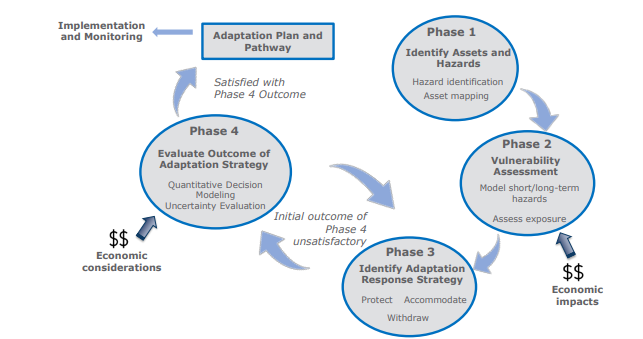Coastal Adaptation Decision and Planning Toolkit
By Cheryl J. Hapke, Ph.D., Senior Consultant
Do you need to address coastal hazards related to sea level rise and climate change? Integral’s Coastal ADAPT is a state-of-the-science approach that informs adaptation planning and facilitates community involvement in decision-making.
Developing robust sea level rise adaptation and management plans to increase resiliency is critical for coastal cities, communities, infrastructure, and facilities. Coastal ADAPT provides a framework used to move a community through hazard awareness into adaptation planning. Coastal ADAPT engages stakeholders in an interactive way, supporting development of a holistic adaptation plan specific to your needs.
Coastal ADAPT is a scientific and model-based decision support framework for sea level rise and coastal hazard adaptation planning. In Phase 1, hazards are identified based on geomorphic interpretation and modeling. During Phase 2, vulnerability and exposure are assessed. Phase 4 implements an innovative, iterative modeling process to evaluate physical and economic changes from various adaptation choices. Clients may also include an economic analysis of market and nonmarket valuation, an assessment of fiscal impacts, and a cost–benefit analysis of adaptation tradeoffs. Results lead to a cohesive plan that engages stakeholders, increases resiliency, and reduces impacts from climate change.
Selected Projects
Coastal Resiliency Program:
County of Ventura, California
Our staff assisted the County in conducting a vulnerability and fiscal impact study to support adaptation planning and updates to the local coastal program policy. We analyzed data and performed additional hazard modeling to round out data gaps in coastal resilience modeling. In a unique approach, we evaluated nonmarket recreational revenues as part of the integrated fiscal impact and economic analyses. Public outreach and communications were also a key focus. The adaptation planning prioritized natural infrastructure approaches—including a dune restoration and management plan, sand retention with cobble groins, and innovative sediment management that improved coastal recreation while reducing engineering and maintenance costs. The project received an award from the American Planning Association.
Sea Level Rise Adaptation:
Captiva Island, Florida
The residents of unincorporated Captiva Island, Florida, recognized that their low-lying barrier island community was vulnerable to sea level rise so they formed a committee to develop an adaption plan. But they didn’t know where to begin, nor did they have the technical expertise to develop a robust plan for sea level rise adaptation. We worked side-by-side with committee members to identify the island’s vulnerability to rising seas and conduct a risk assessment of the island’s assets including homes and evacuation routes, so they could evaluate the best adaptation strategies for their community.




